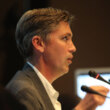Abundance: the future is better than you think
Description
More Details
Also in this Series
Published Reviews
Choice Review
Optimism supported by action can turn dreams into reality. The ultimate goal is good health, education, and freedom for people worldwide. Here, technology entrepreneur Diamandis (X PRIZE Foundation; Singularity Univ.) and author/journalist Kotler discuss intermediate goals for a global society willing to cooperate. The next 25 years of world population growth, producing several billion additional people, will necessitate a focus on clean water, sufficient food, adequate housing, abundant energy, innovative health care, and universal education. Linear improvements will not meet these exponentially expanding requirements, so "technophilanthropists" are needed to encourage radical, game-changing innovations through their financial support. For example, the introduction of smart phone technology in underdeveloped countries brought access to information unavailable just ten years ago, resulting in improvements to local communities, countries, regions, and the world. But the many past accomplishments do not balance the enormous problems ahead for genuine progress amid wars, illness/epidemics, weather extremes, droughts, pollution, religious practices, and local customs that continually plague every area of the globe. According to the authors, technology and information sharing, combined with local action, may improve the odds of success. The 81 charts and tables show trends that support the engaging text, with notes and an appendix. Summing Up: Recommended. All readership levels. F. Potter formerly, University of California, Irvine
Booklist Review
We live in an age of incredible innovation in technology, medicine, and food science, under living conditions our ancestors would have killed for. Yet in poll after poll, the vast majority of people bemoan that things are getting worse, not better. This tendency for people to regret a loss much more than celebrate success may have helped us survive in the early days of our evolution, but in this age of abundance, clinging to bad news does more harm than good. This message is the springboard for Diamandis and Kotler to explore what the future holds for a species used to linear and local thinking in an age of exponential and global growth. We've seen that exponential growth in computer processing, which has taken a camera, telephone, computer, GPS, video games, and music system and put them in one device that fits in your pocket. The authors describe how similar exponential growth is being applied in areas like artificial intelligence, robotics, food production, and clean energy, which could usher in a global era of abundance, particularly for the bottom billion, the poorest of the poor who have the most to gain in a future world in which abundance spreads like wildfire.--Siegfried, David Copyright 2010 Booklist
Publisher's Weekly Review
Diamandis, a tech-entrepreneur turned philanthropist, and journalist Kolter (The Angle Quickest for Flight) contend that widespread pessimism about the future is due in part to our cognitive biases and the effects of mass media. Bad news sells newspapers, while good news escapes our attention or remains hidden in statistics. This engaging book is a needed corrective, a whirlwind tour of the latest developments in health care, agriculture, energy, and other fields as well as an introduction to thinkers and innovators such as Daniel Kahneman, Ray Kurzweil, and Craig Ventor. Augmented by the power of exponentially growing technologies, small groups of motivated individuals are accomplishing what used to require the resources of government or large corporations. Other forces driving innovation are infusions of money from techno-billionaires turned philanthropists and the integration of the poorest third of humanity into the global economy. Not every development will be appreciated; steak lovers may not take readily to in-vitro beef. New technologies contain novel risks, including the disquieting fact that robots will soon make up the majority of the blue-collar workforce. Nonetheless, the authors make a compelling case for optimism over dread as we face the exhilarating unknown. Agent: John Brockman, Brockman Inc. (Feb.) (c) Copyright PWxyz, LLC. All rights reserved.
Kirkus Book Review
A Small Furry Prayer: Dog Rescue and the Meaning of Life, 2010, etc.), things are going to work out just fine. The title speaks volumes. A tenet of capitalism is that resources are scarce, which justifies our scramble to get what we can. Yet, write the authors, "when seen through the lens of technology, few resources are truly scarce, they're mainly inaccessible." So drinking water is scarce and getting scarcer? There's a big ocean out there; what remains to be done is to develop some method to desalinate the ocean's water "in the same way that electrolysis easily transformed bauxite into aluminum." Of course, there is also a major shortage of fossil fuels--but no shortage of sunlight, and in fact more than 5,000 times as much solar power available as we could possibly use in our wildest dreams. It will bring some readers up short to contemplate the abundance that Diamandis and Kotler project in the face of the stark reality that there may well be 10 billion humans on the planet by the year 2050, but that doesn't daunt the authors much, given the human talent for engineering our way out of trouble. Engineering is a major part of their program, as "the purview of backyard tinkerers has extended far beyond custom cars and homebrew computers, and now reaches into once esoteric fields like genetics and robotics." What about the health-care crisis? Well, nothing a few generations of robotic surgeons can't help, if not cure. Food crisis? Just 150 vertical-farm skyscrapers could feed all of New York City. And so on, to the point that there seems to be no problem that the authors find insurmountable, or even especially daunting. A nicely optimistic look at a matter that usually brings out the darkest thoughts among prognosticators--if a touch starry-eyed, at least a dream worth nurturing.]] Copyright Kirkus Reviews, used with permission.



































